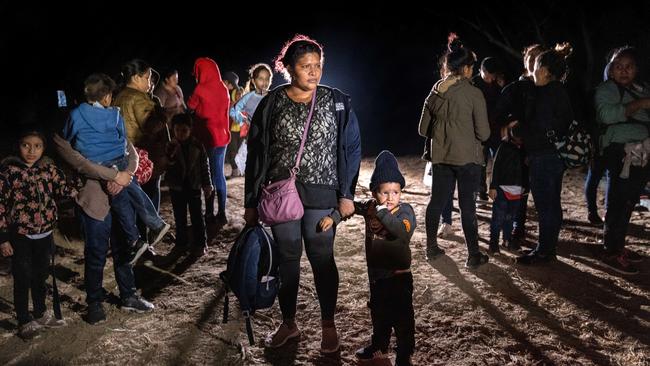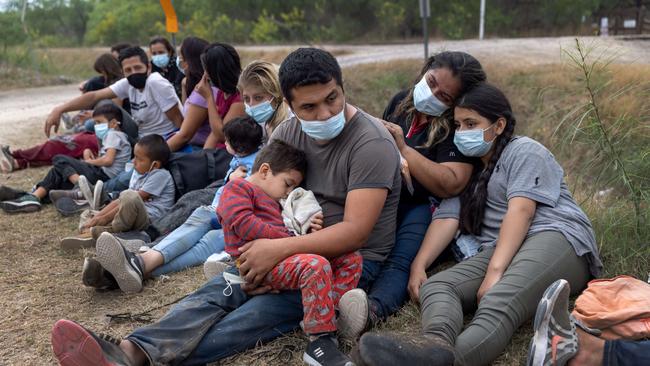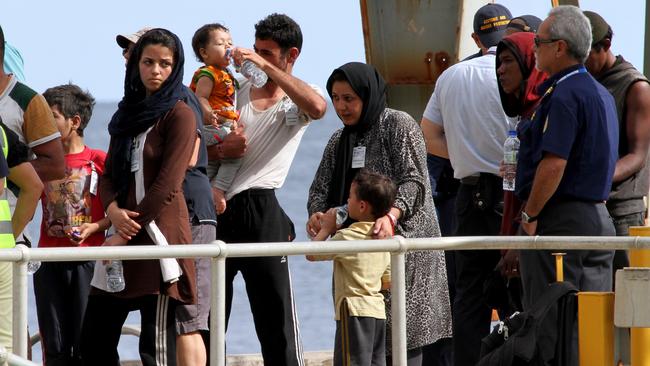US learns the cruelty of Labor’s border ‘kindness’
The same political and economic forces that saw the Rudd government tear up John Howard’s tough border policies with disastrous results, are now playing out in the US.

The Biden administration has prompted a surge in asylum-seekers and unauthorised arrivals on the southern border with Mexico, culminating in a growing humanitarian disaster that is overwhelming US capacity to house and feed the 172,000 people that arrived in March alone.
Before the presidential election, Democrats had promised a kinder, gentler immigration policy, much as Kevin Rudd had in 2007.
Once again, kindness is paying mixed dividends. Just as Australians saw grisly images of rickety boats, Americans are seeing children dropped over fences, on the hope that their parents would eventually be allowed to join them.
Vice President Kamala Harris, appointed by Joe Biden as “border tsar” last month, with responsibility for slowing the surge in immigration, on Tuesday promised to fly to Guatemala and Mexico to investigate the “root causes” of the influx.
She would be well advised to read up on what happened in Australia between 2007 and 2013.
In Australia in 2001, after 5500 people arrived on 43 boats, including the infamous Tampa, the Howard government excised various islands from the national migration zone and required arrivals to be processed outside Australia. In 2002, one unauthorised boat arrived.
In the US in 2019, unauthorised crossings on the Mexican border surged, peaking at 144,000 in May, from around 45,000 a month in 2018.

The Trump administration introduced three rules to stem the tide. It signed agreements with Guatemala, Honduras and El Salvador, the “northern triangle”, that meant asylum-seekers would be processed in nearby nations, not the US, echoing Howard government changes that saw asylum-seekers processed in Papua New Guinea.
It signed a migration protocol with Mexico, to ensure arrivals from the US’s giant southern neighbour would be processed in Mexico.
Finally, it used a little known 1944 public health law to close the border to asylum-seekers, known as “title 42”, which the Trump administration was using to turn away unaccompanied children. The Biden administration has used it only to turn away adults, not children.
And of course, the Biden administration stopped building Donald Trump’s totemic wall, which leaves hundreds of kilometres of gaps.
However cruel Trump’s policies seemed to some, it appeared to work. The number of children in US care fell from 69,550 in 2019 to 15,538 according to the US Department of Health and Human Services. The total number of border “encounters” have surged from 72,000 in October last year to 172,300 in March, according to the US Customs and Border Protection data.
This is the same frustrating outcome the first Rudd government endured, when a growing tidal wave of boats were intercepted by authorities, peaking at 268, with 17,200 people, in 2012 alone. More than 1000 people drowned.
If Australia is any guide, the US government will be forced into a humiliating backdown. Labor reversed its policies in 2013, introducing even more draconian policies, that once again saw the flow of arrivals shrivel up.
Already, two states, Missouri and Texas, have filed a lawsuit against the Biden administration in the US federal court. “The influx of unlawful immigrants with meritless claims of asylum will result in additional unlawful migrants entering and remaining in Texas and Missouri, forcing both states to expend more taxpayer resources on health care, education, social services and similar services for such migrants,” the states said in their claim.
For weeks Harris has come under pressure to visit the southern border.
“It’s fine to visit Mexico and Guatemala, but to understand the challenges and pressure of the situation, she really needs to talk to the men and women at the border patrol doing this every day,” Chad Wolf, who was acting secretary of Homeland Security during the Trump administration, told Inquirer.

“She should talk to some of the migrants, the different NGOs, to better understand the root causes. She was critical of the children being housed in border patrol stations under the Trump administration. Well, now they have two to three times as many as we did in 2019.”
In her first remarks about the immigration surge this week, the Vice President denied families wanted to come to the US for a better life. “They don’t want to leave the place where their grandparents lived. They don’t want to leave the place where they are familiar with the culture and the language,” Harris said, in a meeting with experts at the White House.
The Vice President said the US government would instead provide “hope” to the people of the northern triangle “that if they stay at home, help is on the way”, suggesting the Biden administration might increase aid to its much poorer southern neighbours.
The Democrats argue, as did Labor in 2008, that “push factors” are driving the surge: the pandemic has seen economic and social chaos in Central America, prompting families to seek a better life.
“It happens every year,” Biden said in a news conference last month, suggesting the surge was seasonal. No doubt, some push factors might be at play, but incentives matter.
The president of Guatemala, Alejandro Giammattei, at least agrees. “I believe that in the first few weeks of the Biden administration, messages were confusing. They were compassionate messages that were understood by people in our country, especially the coyotes, to tell families, ‘We’ll take the children’,” he said on Tuesday.
Wolf said: “It’s not only the policies but the messaging too. If the cartels know you’re pulling down programs making it easier to do business, then that will have consequences”.
Understanding why left-of-centre governments relax border restrictions is puzzling. More low-skilled immigration almost certainly lowers the wages of workers already in the country. Perhaps because of that, polls suggest many new immigrants support strict immigration policies.
It’s practically impossible for the US to accommodate the desires of neighbouring people to immigrate to the US. El Salvador, Guatemala, Honduras and Mexico are home to a combined 165 million people.
Perhaps it’s the greater and new-found personal rewards available from virtue signalling on social media. Perhaps it’s a growing disdain for economics incentives. At its root, socialism can only function if personal incentives do not matter, that is, individuals are happy to work for the greater good. This principle has worked out poorly in the past.
Margaret Thatcher once said the facts of life are conservative. When it comes to illegal immigration at least, the US and Australian experiences show she was right.


Exactly the same political and economic forces that saw the Rudd government tear up John Howard’s tough border protection policies in 2008, with disastrous results, are now playing out in the US.